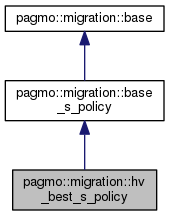|
PaGMO
1.1.5
|
|
PaGMO
1.1.5
|
Choose 'n' greatest contributors migration policy. More...
#include <hv_best_s_policy.h>

Public Member Functions | |
| hv_best_s_policy (const double &rate=1, rate_type type=absolute, double nadir_eps=1.0) | |
| Constructor from migration rate and type. More... | |
| base_s_policy_ptr | clone () const |
| Clone method. More... | |
| std::vector< population::individual_type > | select (population &) const |
| Select individuals to emigrate from the given population. More... | |
 Public Member Functions inherited from pagmo::migration::base_s_policy Public Member Functions inherited from pagmo::migration::base_s_policy | |
| base_s_policy (const double &rate=1, rate_type type=absolute) | |
| Constructor from migration rate and type. More... | |
| virtual | ~base_s_policy () |
| Trivial destructor. More... | |
 Public Member Functions inherited from pagmo::migration::base Public Member Functions inherited from pagmo::migration::base | |
| base (const double &, rate_type) | |
| Constructor from migration rate and type. More... | |
| population::size_type | get_n_individuals (const population &) const |
| Get number of individuals to migrate from/to input population. More... | |
| std::string | human_readable () const |
| Return human readable representation. More... | |
| virtual | ~base () |
| Destructor. More... | |
Friends | |
| class | boost::serialization::access |
Additional Inherited Members | |
 Protected Member Functions inherited from pagmo::migration::base Protected Member Functions inherited from pagmo::migration::base | |
| virtual std::string | human_readable_extra () const |
| Return extra information in human readable representation. More... | |
 Static Protected Member Functions inherited from pagmo::migration::base Static Protected Member Functions inherited from pagmo::migration::base | |
| template<class ForwardIterator , class T > | |
| static void | iota (ForwardIterator first, ForwardIterator last, T value) |
| Iota function, usefull to fill iterator range with increasing values. More... | |
 Protected Attributes inherited from pagmo::migration::base Protected Attributes inherited from pagmo::migration::base | |
| double | m_rate |
| Migration rate. More... | |
| rate_type | m_type |
| Migration rate type. | |
Choose 'n' greatest contributors migration policy.
This policy chooses the individuals that contribute the greatest amount of volume to the total hypervolume. Contributions of all individuals are computed, after which a set of 'n' best candidates is determined.
Note: If the problem is a single objective one, we fall back to the pagmo::migration::best_s_policy instead.
Definition at line 48 of file hv_best_s_policy.h.
| pagmo::migration::hv_best_s_policy::hv_best_s_policy | ( | const double & | rate = 1, |
| rate_type | type = absolute, |
||
| double | nadir_eps = 1.0 |
||
| ) |
Constructor from migration rate and type.
| [in] | rate | migration rate. |
| [in] | type | migration rate type. |
| [in] | nadir_eps | epsilon value for the nadir point computation |
Definition at line 50 of file hv_best_s_policy.cpp.
|
virtual |
Clone method.
Provided that the derived policy implements properly the copy constructor, virtually all implementations of this method will look like this:
return base_ptr(new derived_policy(*this));
@return migration::base_s_policy_ptr to a copy of this.
Implements pagmo::migration::base_s_policy.
Definition at line 52 of file hv_best_s_policy.cpp.
|
virtual |
Select individuals to emigrate from the given population.
This is the method that actually implements the policy. Output vector should contain copies of selected individuals.
| [in,out] | pop | source population. In some cases (see best_kill_s-policy) it can be modified (e.g. killing the selected individual) |
Implements pagmo::migration::base_s_policy.
Definition at line 62 of file hv_best_s_policy.cpp.
 1.8.9.1
1.8.9.1